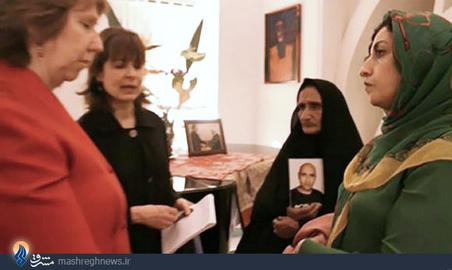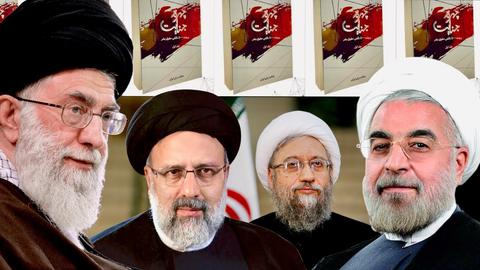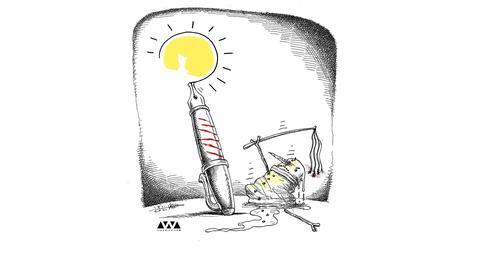Human rights activist Narges Mohammadi has spoken to Iranians on the Clubhouse app about human rights and negotiations between Iran and other countries, the 2021 presidential election, and the harassment and torture of prisoners. The May 31 event marked the second time she went on to the platform, which has become increasingly popular among Iranians, in the space of a week. Mohammadi, the vice president and spokesperson for the Center for Human Rights Defenders, was recently sentenced to 30 months in prison, 80 lashes, and two fines. Branch 1177 of the Second Criminal Court in Quds Judicial Complex in Tehran handed down the verdict.
On May 26, Mohammadi told a Clubhouse audience that she was given the sentence and charged with "disobeying orders” when she spoke out about being sexually harassed by a senior official at Evin Prison.
***
During the Clubhouse event, Mohammadi repeated her call for human rights violations to be highlighted in all negotiations between Western governments and the Islamic Republic.
An IranWire journalist asked her about how human rights work can have an impact on larger political and diplomatic spheres. "In today's world, we see three approaches to defending human rights,” Mohammadi said. “First, the regulatory approach, whereby human rights organizations prepare reports about human rights violations and present them to public opinion. In my view this is a very effective tool to limit human rights violations by various governments.
“The second strategy is a supportive one. If human rights defenders or pro-democracy groups are pressured by governments for any reason, members of the international community support these activists. Again, I think this is another very effective step in preventing continued human rights abuses by governments. But the third approach, which I think is essential in this case, is the guarantee approach. Countries must have a strong mechanism to ensure respect for human rights. It is a country’s civil society institutions that, by putting pressure on their governments, persuade them to act in accordance with human rights standards. In the West, because of fundamental freedoms, civil society organizations can force their governments to take a stand and make appropriate decisions about human rights abuses around the world."
Putting Human Rights at the Heart of the Negotiations Agenda
Although Mohammadi emphasized that each of these mechanisms, when applied by countries, can help improve the human rights situation in other countries, including Iran, she said when it came to human rights violations in the Islamic Republic, the support of international civil society organizations in the West were the most effective at applying pressure and had the best chance of putting an end to the crimes. She called on international human rights organizations to play their part in pressuring Western governments to bring the issue of human rights abuses into any negotiations with the Islamic Republic.
Mohammadi conceded that human rights organizations are less powerful in face of religious, governmental, and economic institutions, and she told journalists attending the Clubhouse event there was a real need to strengthen these groups and their impact on the world."Part of the plan to empower international human rights institutions links to the performance of the media, civil society and international institutions, and another part is that these institutions can empower their governments to request human rights guarantees in their decision-making process.
“There are some who say the issue of human rights can be raised on the sidelines of negotiations between the Islamic Republic and the West. But I believe that Western governments have a duty to put this issue right at the center of their negotiations with the government.
"My request from the international community, and those who enter into any negotiations with Iran, is to raise the issue of human rights as a basic condition for reaching any agreement. My expectation is that they will then put the human rights case on the table instead of ignoring it. Western governments must enter into negotiations with the Islamic Republic on the basis of human rights guarantees."
Back in 2013, Catherine Ashton, who was at the time the European Union foreign policy chief, met with Narges Mohammadi during a visit to Tehran in the first months of Hassan Rouhani’s presidency. The meeting, held at the Austrian embassy in Tehran, angered many government figures. When Mohammadi later faced charges of "propaganda against the regime" and "conspiracy to disrupt the security of the country,” it was widely believed to be punishment for the meeting.
When asked how she would respond if Western governments failed to raise human rights during negotiations with Iran, she said: "The international community has no right to endanger human rights and ignore the safety of citizens in Iran. In fact, the United Nations has a duty to intervene to improve human rights. Negotiations, decisions and policies made by Western governments must guarantee the fundamental freedoms of the Iranian people — not the interests of its government."
Journalists, as well as members of human rights groups PEN International and Amnesty International, attended the Clubhouse press conference. One attendee asked about current sanctions against Iran. "I agree with boycotting human rights violators and oppressors and restricting their presence in international forums,” Mohammadi said. “Cutting off and controlling the movements, facilities and tools used by the Islamic Republic to suppress critics is in the interest of the Iranian people. And I certainly agree with that.”
Recalling the Islamic Republic's use of European-made surveillance equipment to intimidate protesters during the Green Movement protests in 2009, Mohammadi said economic sanctions did not have the desired impact on human rights abuses in Iran. "I do not consider the current economic sanctions to be an intelligent policy. These sanctions, along with the government’s inefficiency, have made the Iranian people poorer."
She argued that when leaders and governments introduce policies to limit authoritarians, these measures should never limit the power of the people. "It should be noted that in Iran, economic bottlenecks are in the hands of the government, so in my opinion, the West's understanding of how Iranian society works is not correct."
The Power of Election Boycotts
Like others — including former politician and activist Faezeh Hashemi — Mohammadi has stated that she will not be voting in Iran’s presidential election on June 18.
“I will definitely boycott it and will try to convince others to boycott it as well. If the political rights of the people, such as freedom of expression and the right to gather, are not upheld during the elections, voting will have very little effect on society. Merely holding elections does not guarantee the manifestation of the real will of the people. In Iran, elections do not mean the expression of the real will of the people. This is nothing new, and it’s a problem we have faced in previous elections, but for some reason, many people still went to the polls.
"In times such as in 2009, people used the ballot to seriously challenge and confront the government; in other election periods the people voted for candidates who had even a slight dispute with the government. They used this limited space to take a political breath.
“But in the current environment, elections have lost their minimum function. We have decided not to participate in the elections, but to show our opposition to the repressive government and challenge it. For the past 42 years, elections based on the laws and conduct of the government have been tumultuous, fraudulent and unregulated."
Narges Mohammadi also referred to the widespread disqualification of candidates for the Islamic Republic's presidential election, calling it an "appointment" rather than an election and continued: "According to the evidence and standards of free elections, what is happening now is an appointment. A group of analysts say that it is the power of the Islamic Republic that has been able to deprive even some of its close entourage from running in the elections as candidates. But I believe that because the Iranian government finds itself in a very weak position, it is afraid of any confrontation with the people and runs away. In fact, the Islamic Republic, for fear of any popular protest taking shape, has agreed to hold do an appointment instead of a real election."
A journalist at the Clubhouse event asked Mohammadi about Iran’s reformists and whether there was any hope that they might perform well in elections. "Although there is no hope of changing behaviors or for reforms in the Islamic Republic, I am still very hopeful for the Iranian society. We have very large social movements that have gained valuable experiences, especially in recent years. In this decades-long struggle by the people, it is true that we have not achieved democracy, but we did make important achievements. In Iran there is a powerful force for democracy, and although democracy cannot be achieved in a single movement, through parallel movements, we can get closer to democracy."
Speaking up Against Attacks on Women Prisoners
Mohammadi also called for legal action to be taken against perpetrators of torture of political prisoners. “The Islamic Republic arrested Shahnaz Akmali, the mother of Mostafa Karim-Beigi, who was killed during the Green Movement, and Akram Neghabi, the mother of Saeed Zinali, a young man who was arrested shortly after the events of July 8, 1999 and who is still missing, pressuring them to withdraw the lawsuits they filed for what had been done to their children.
"Pressuring political prisoners to cooperate with the Islamic Republic and express remorse for their actions is nothing a new: it has happened to thousands of people, and I am one of them. Can you believe what mothers Shahnaz Akmali and Akram Neghabi were put through while they were in solitary confinement? I have also been asked to resign from the Defenders of Human Rights Center and to stop working with human rights activists, but I refuse to do that. They asked Nazanin Zaghari-Ratcliffe to cooperate with agents on her return to London. Nazanin refused to do this and for this reason she remains in prison in Tehran.
"When we oppose the interrogators' demands, we face severe deprivations. I was not just imprisoned for my activities. I lost my job and was denied access to my children for six years. I lost my life. But our resistance will not be broken by these threats."
Narges Mohammadi told the story of several female political prisoners in Iran in her 2020 book "White Torture" , and outlined that solitary confinement amounts to a form of torture, and is part of a system Islamic Republic authorities have created to intimidate and control prisoners. Key to this is cutting political detainees off from other inmates and keeping them from knowing anything about the outside world. "In these conditions, interrogators exploit prisoners’ ignorance and isolation to pressure them and get what they want. In solitary confinement, one way to get a confession is to humiliate a prisoner."
She highlighted the experiences of several female political prisoners who had endured sexual harassment and assault from their interrogators while in solitary confinement. "One prisoner was forced to say that she was raped as a child. When a prisoner is forced to say such a thing in front of an interrogator, she loses her ability to resist. In solitary confinement, humans suffer from a kind of invisibility and are unable to remember and protect the identity they had outside prison."
Mohammadi told the Clubhouse audience that she refused to remain silent in the face of assaults on women in Iranian prisons. "I witnessed in the public ward of Evin Prison that many people coming from solitary confinement were given a large number of pills for psychiatric ailments every day. They said they had not taken medication before being in solitary confinement, but that the prison doctor prescribed them to deal with the complications they suffered.
"A number of people described interrogations and sexual harassment by their interrogators to me, but they refused to file a complaint with the judiciary out of fear of being persecuted. In 2010, after being transferred to a public ward at Evin Prison from solitary confinement in Ward 209, I shared a cell with a woman for a few days. She told me she had been physically assaulted and that interrogators had touched her chest, and that she had suffered from many side effects as a result of the psychological pressure caused by the torture. She was on a lot of medication and covered herself up with blankets all day. Sometimes I was not even sure whether she was breathing. She told me she had suffered many nervous breakdowns and that she had returned to prison after being taken to the hospital."
Narges Mohammadi said that White Torture, as well as a lawsuit lodged by a group of political prisoners about torture in solitary confinement, were two significant moves s in documenting what is happening in Iranian prisons and setting in motion a process of bringing about justice.
Related Coverage:



























comments